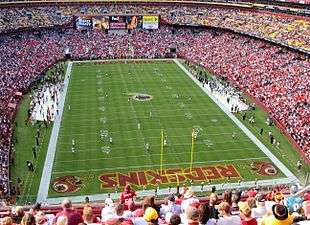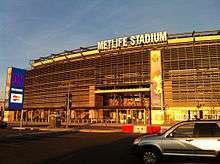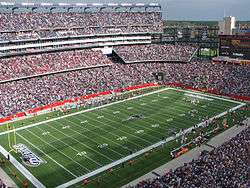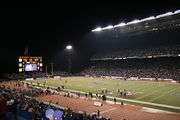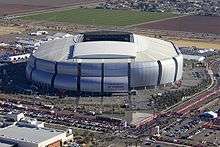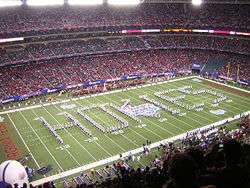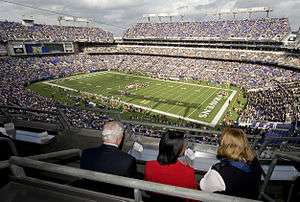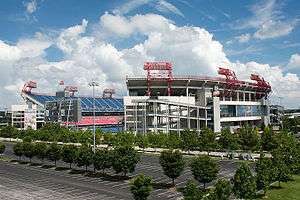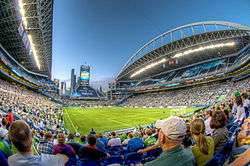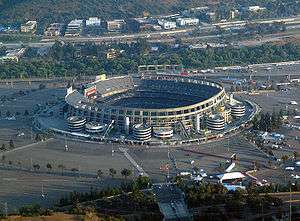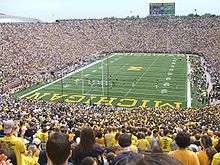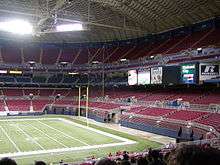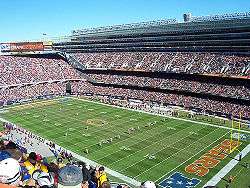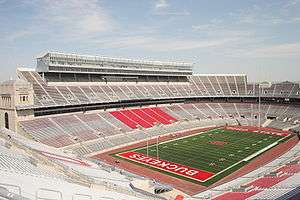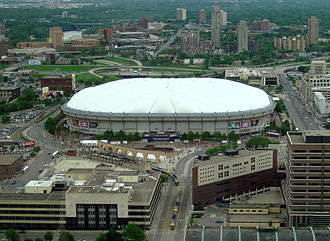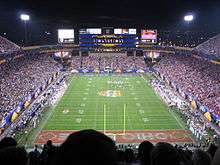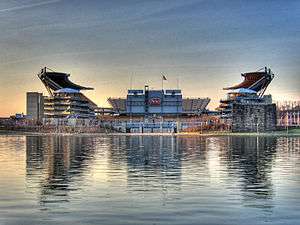United States 2022 FIFA World Cup bid
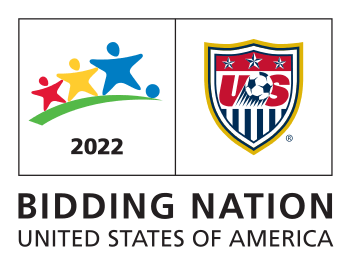
The United States Soccer Federation submitted a bid[1] with the hope of hosting the 2022 FIFA World Cup. U.S. Soccer first said in February 2007 that it would put forth a bid for the 2018 World Cup.[1] On January 28, 2009, U.S. Soccer announced that it would submit bids for both the 2018 and 2022 Cups.[2] In October 2010 it withdrew from the 2018 bid process to focus on winning the 2022 edition.[3] On 2 December 2010, it was announced that Qatar would be the host of the 2022 FIFA World Cup.[4] Bill Clinton remarked "The FIFA people were in a mood to give it to people who didn’t have it. I think they wanted to make soccer a world sport." [5]
David Downs, president of Univision Sports, was executive director of the bid.[6] The United States previously hosted the FIFA World Cup in 1994, as well as the FIFA Women's World Cup in 1999 and 2003.
Schedule
| Date | Notes |
|---|---|
| January 15, 2009 | Applications formally invited |
| February 2, 2009 | Closing date for registering intention to bid |
| March 16, 2009 | Deadline to submit completed bid registration forms |
| May 14, 2010 | Deadline for submission of full details of bid |
| September 6–9, 2010 | Inspection committee visits the United States[7] |
| December 2, 2010 | FIFA to appoint hosts for 2018 and 2022 World Cups |
Bid committee
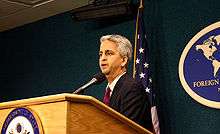
The American bid was being organized by USA Bid Committee, Inc.
The executive director of the bid was David Downs, CEO of Univision sports. Other members include U.S. Soccer President Sunil Gulati, Major League Soccer Commissioner Don Garber, Phil Murphy, the former national finance chair for the Democratic National Committee,[8] former U.S. Secretary of State Dr. Henry Kissinger, New York City mayor Michael Bloomberg, California Governor Arnold Schwarzenegger, Clinton adviser Douglas Band,[9] film director Spike Lee,[10] former boxer Oscar De La Hoya, and Washington Post publisher Katharine Weymouth.[11][12]
Details of the bid
In April 2009, the U.S. identified 70 stadiums in 50 communities as possible venues for the tournament, with 58 confirming their interest.[13] The list of stadia was trimmed two months later to 38 existing venues, one scheduled for completion in 2010, and one proposed venue.[11] On August 20, 2009 the list was further trimmed down to 32 stadiums in 27 cities.[14] On January 12, 2010 the USA Bid Committee narrowed the 27 cities down to 18 as the official host cities for the United States' Bid for the 2018 or 2022 World Cup.[15]
Those 18 cities are: Atlanta, Baltimore, Boston, Dallas, Denver, Houston, Indianapolis, Kansas City, Los Angeles, Miami, Nashville, New York City, Philadelphia, Phoenix, San Diego, Seattle, Tampa and Washington, D.C. The 20 stadiums selected host NFL or NCAA American football games, with a capacity over 65,000 spectators. No soccer-specific stadium was selected, since none in the country has capacity for more than 30,000 spectators.
Candidate venues
- † – American football team.
- Although sponsored stadium names are listed in this article, they were not used in the actual bid documents, and would not be used during the World Cup. FIFA controls all naming rights related to the World Cup, and generally prohibits the use of such names. Even stadiums that bear the names of FIFA sponsors are subject to this restriction—the venue then known commercially as Coca-Cola Park in Johannesburg was known by its non-commercial name of Ellis Park Stadium during the 2010 World Cup, even though The Coca-Cola Company is one of FIFA's main sponsors.
- Capacities listed are estimated capacity for the FIFA World Cup.[15]
Rejected venues
The following venues were considered as possible candidate venues but were not chosen to be included in the final bid.[15]
August 2009 cut
The following stadiums were eliminated in an earlier cut in August 2009
June cut
The following stadiums were eliminated at the first cut in June, 2009:[17]
- California Memorial Stadium, Berkeley, California
- Ralph Wilson Stadium, Buffalo, New York
- Memorial Stadium, Champaign, Illinois
- Paul Brown Stadium, Cincinnati
- Memorial Stadium, Clemson, South Carolina
- Faurot Field, Columbia, Missouri
- Williams-Brice Stadium, Columbia, South Carolina
- Razorback Stadium, Fayetteville, Arkansas
- Ben Hill Griffin Stadium, Gainesville, Florida
- Lambeau Field, Green Bay, Wisconsin
- Rice Stadium, Houston, Texas
- Kinnick Stadium, Iowa City, Iowa
- Commonwealth Stadium, Lexington, Kentucky
- Camp Randall Stadium, Madison, Wisconsin
- Yale Bowl, New Haven, Connecticut
- Louisiana Superdome, New Orleans
- Oklahoma Memorial Stadium, Norman, Oklahoma
- Doak Campbell Stadium, Tallahassee, Florida
Denied interest in hosting[17]
- Sanford Stadium, Athens, Georgia; 1996 Summer Olympics soccer venue
- Jordan-Hare Stadium, Auburn, Alabama
- Darrell K Royal – Texas Memorial Stadium, Austin, Texas
- Tiger Stadium, Baton Rouge, Louisiana
- Lane Stadium, Blacksburg, Virginia
- Kyle Field, College Station, Texas
- Spartan Stadium, East Lansing, Michigan
- Memorial Stadium, Lincoln, Nebraska
- LaVell Edwards Stadium, Provo, Utah
- Notre Dame Stadium, South Bend, Indiana
- Beaver Stadium, State College, Pennsylvania
- Bryant–Denny Stadium, Tuscaloosa, Alabama
Official bid partners
- Fox Soccer Channel
- AT&T
- American Airlines
- The Walt Disney Company
- Chevron Corporation
- Kohl's
- Subway Restaurants
Notes and references
- 1 2 Goff, Steven (February 20, 2007). "U.S. to Seek World Cup". The Washington Post. Retrieved October 28, 2007.
- ↑ "U.S. to bid for 2018 and 2022 World Cups". ESPNsoccernet. Chicago. Associated Press. January 29, 2009. Retrieved January 29, 2009.
- ↑ "US withdraw bid to host 2018 World Cup". BBC Sport. October 15, 2010.
- ↑ "2018 and 2022 FIFA World Cup Hosts Announced". BBC News. 2 December 2010. Retrieved 2 December 2010.
- ↑ "Bill Clinton on Why Qatar Got the World Cup". WSJ. December 3, 2010.
- ↑ Goff, Steve (February 2, 2009). "USA in '18 (or '22)". The Washington Post. Retrieved September 4, 2009.
- ↑ "FIFA receives bidding documents for 2018 and 2022 FIFA World Cups" (Press release). FIFA.com. May 14, 2010. Retrieved July 31, 2010.
- ↑ Goff, Steve (February 2, 2009). "USA in '18 (or '22)". The Washington Post. Retrieved February 4, 2009.
- ↑ "Counselor To President Clinton, Douglas Band, Joins Team To Bring FIFA World Cup To United States in 2018 or 2022". U.S. Soccer. April 8, 2010. Retrieved July 27, 2010.
- ↑ "Spike Lee joins US World Cup bid committee". USA Today. January 4, 2010. Retrieved May 26, 2010.
- 1 2 "USA Bid Committee Issues Requests For Proposals to 37 Potential FIFA World Cup Host Cities For 2018 or 2022" (Press release). United States Soccer Federation. June 16, 2009. Archived from the original on 19 Jun 2009. Retrieved June 18, 2009.
- ↑ Goff, Steven (November 2, 2009). "Weymouth Joins Cup Effort". The Washington Post. Retrieved November 2, 2009.
- ↑ "USA Bid Committee Receives Confirmation From 58 Venues Interested in Holding FIFA World Cup Matches in 2018 or 2022" (Press release). United States Soccer Federation. April 23, 2009. Retrieved April 24, 2009.
- ↑ "USA Bid Committee Announces List of 27 Cities Still in Contention For Inclusion in U.S. Bid to Host FIFA World Cup in 2018 or 2022" (Press release). United States Soccer Federation. August 20, 2009. Retrieved August 20, 2009.
- 1 2 3 "Bid Committee announces official bid cities" (Press release). The USA Bid Committee. January 12, 2010. Retrieved January 12, 2010.
- 1 2 Developers of LA's proposed NFL stadium expand plans to lure World Cup, Developers of LA's proposed NFL stadium expand plans to lure World Cup
- 1 2 http://www.gousabid.com/news/entry/58-venues-interested-in-holding-fifa-world-cup-matches-in-2018-or-2022/



